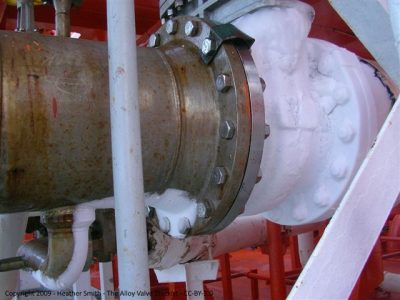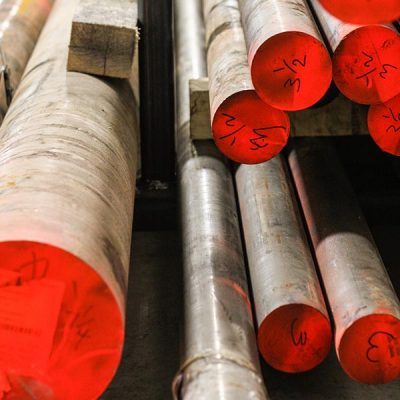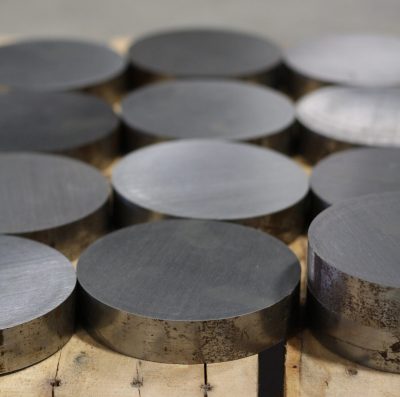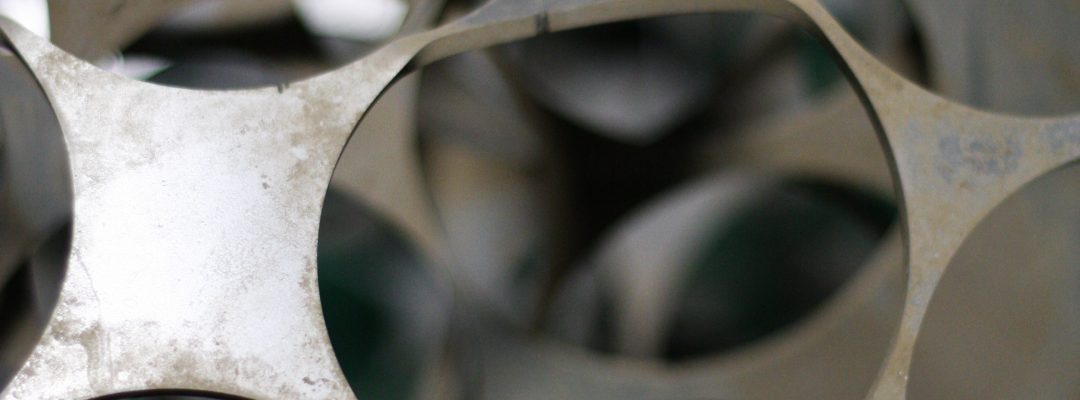Materials
How does “working temperature” affect material selection for a Belleville washer or disc spring?
Every metal has a “working temperature” range, or the maximum and minimum temperatures at which it will continue to function properly in the working environment. Some metals are designed, specifically, to withstand very high or very low temperatures. Others are intended for use in environments where the temperatures are not extreme.

When designing industrial components, it is critically important to know the temperatures at which the equipment must operate. Components must be manufactured from materials that can withstand those temperatures. For example, Belleville disc springs used in cryogenic applications must be made from materials designed to withstand temperatures of -238°F (-150°C) to absolute zero.
Choosing the correct metal is just one part of overall design. BelleFlex® engineers can guide you in the overall design of Belleville disc springs for your application, including the choice of metals.
Available Materials
 BelleFlex® can meet your company’s need for nearly any material or application. Our in-stock Belleville washers and disc springs, such as inch series bolt washers, ball bearing disc springs, flange bolting, and metric fasteners, are available in a wide range of materials for more common applications. Our extensive raw material inventory allows us to provide quick turnaround on non-standard and custom applications, as well. For even more specialized needs, other materials are available upon request. BelleFlex® maintains a national base of raw material suppliers, enabling us to quickly procure special materials for unique applications.
BelleFlex® can meet your company’s need for nearly any material or application. Our in-stock Belleville washers and disc springs, such as inch series bolt washers, ball bearing disc springs, flange bolting, and metric fasteners, are available in a wide range of materials for more common applications. Our extensive raw material inventory allows us to provide quick turnaround on non-standard and custom applications, as well. For even more specialized needs, other materials are available upon request. BelleFlex® maintains a national base of raw material suppliers, enabling us to quickly procure special materials for unique applications.

Materials may be plated or coated. BelleFlex® utilizes plating materials, such as clear zinc, yellow zinc, cadmium (cad clear), chrome, and electroless nickel (EN). Coating materials include phosphate and oil, black oxide, and Teflon. We can plate or coat with nearly any material required for an application.
BelleFlex® engineers are available 24/7 to provide assistance with material selection, specifications, and design and engineering support for custom applications. We urge you to contact our engineering team to discuss your requirements and to identify the right material and finish to meet your needs.
The table below provides a quick reference of our most commonly used materials.
| Material | Typical Operating Temperature | Description |
|---|---|---|
| 1074/1075 High Carbon Steel | -40°F to 350°F | Non-alloyed high carbon steel |
| 6150 Alloy Steel | -40°F to 350°F | Chromium-vanadium alloy steel |
| H13 Tool Steel | Up to 1000°F | Chromium-molybdenum-vanadium alloy tool steel |
| 300 Series Stainless Steel | Up to 390°F, varies by alloy | Austenitic chromium-nickel stainless steels: 301, 302, 303, 304/304L, 316/316L, 321 |
| 17-4 PH® Stainless Steel | Up to 600°F | Martensitic precipitation-hardening stainless steel |
| 17-7 PH® Stainless Steel | -300°F to 600°F | Semi-austenitic precipitation-hardening stainless steel |
| Carpenter Custom 455® Stainless Steel | -300°F to 600°F | Martensitic age-hardening stainless steel |
| INCONEL® Alloys | -400°F to 1300°F, varies by alloy | Nickel-chromium alloys: 625, 718, X-750 |
| 15-5 PH® Stainless Steel | Up to 600°F | Martensitic precipitation-hardening stainless steel |
| PH15-7 Mo® Stainless Steel | Up to 900°F | Semi-austenitic precipitation-hardening stainless steel |
| WASPALOY® Alloy | Up to 1200°F | Nickel-based, age-hardenable superalloy |
| HASTELLOY® Alloys | Varies by alloy | Nickel-based superalloys: B2, B3, C22HS®,C-276 |
| MONEL® Alloys | -150°F to 1000°F | Nickel-copper alloys: 400 & K-500 |
1074/1075 High Carbon Steel
A malleable, iron-based non-alloyed metal containing carbon, small amounts of manganese, and other elements. The 1075 designation is obsolete, since the acceptable carbon content range for both 1074 and 1075 High Carbon Steel is 0.70%-0.80%. Typical operating temperatures -40°F to 350°F.
15-5 PH® Stainless Steel
A martensitic precipitation-hardening stainless steel that is the ferrite-free version of 17-4 PH. It has high strength, is corrosion resistant, and has good mechanical properties. Typical operating temperatures up to to 600°F. (Registered trademark of AK Steel)
17-4 PH® Stainless Steel
A martensitic precipitation-hardening stainless steel, with high strength and hardness, resistance to corrosion, and excellent mechanical properties. It is the most widely used of all the precipitation-hardening stainless steels. Typical operating temperatures up to 600°F. (Registered trademark of AK Steel)
17-7 PH® Stainless Steel
A semi-austenitic precipitation-hardening stainless steel, well-suited for applications requiring high strength and hardness, good fatigue properties, corrosion resistance, and minimum distortion upon heat treatment. 17-7 PH Stainless Steel, when stressed and exposed to corrosive environments, may be subject to spontaneous fracture. Typical operating temperatures -300°F to 600°F. (Registered trademark of AK Steel)
300 Series Stainless Steel
Austenitic chromium-nickel stainless steels known for corrosion resistance and unusually fine mechanical properties. Typical operating temperatures up to 390°F – varies by alloy.
6150 Alloy Steel
A fine-grained, highly abrasion-resistant carbon-chromium alloy steel. It contains chromium and vanadium for added impact hardness. Typical operating temperatures -40°F to 350°F.
Carpenter Custom 455® Stainless Steel
A martensitic age-hardenable, stainless steel alloy with high-strength and good corrosion resistance. Good spring characteristics exist even at relatively large diameters and thicknesses, allowing for a large range of sizes for corrosion-resistant springs. Typical operating temperatures -300°F to 600°F. (Registered trademark of the Carpenter Technology Corporation)
H13 Tool Steel
A versatile, chromium-molybdenum alloy. Its characteristics include high toughness, resistance to thermal fatigue cracking, hardenability, and wear resistance. Typical operating temperatures up to 1000°F.
HASTELLOY® Alloys
A family of nickel-based superalloys widely used in chemical processing industries because they are extremely corrosion resistant. B2, B3, C-22HS®, and C-276 provide high resistance to uniform general corrosion, localized corrosion, and stress corrosion cracking. Typical operating temperatures vary by alloy. (Registered trademark of Haynes International, Inc.)
INCONEL® Alloys
INCONEL® encompasses a family of nickel-chromium alloys. These alloys have high strength, weldability, and corrosion resistance at extreme temperature ranges. Typical operating temperatures for various applications can range from -400°F to 1300°F, depending on the alloy. (Registered trademark of the Special Metals Corporation)
MONEL® Alloys
Nickel-copper alloys with high strength and toughness at extreme temperature ranges. Very corrosion resistant, 400 and K-500 are commonly used in the chemical processing, oil and gas, electronics, and paper processing industries. Typical operating temperatures -150°F to 1000°F. (Registered trademark of the Special Metals Corporation)
PH 15-7 Mo® Stainless Steel
A semi-austenitic precipitation-hardening stainless steel that provides high strength and hardness, corrosion resistance, and minimum distortion on heat treatment. Typical operating temperatures up to 900°F. (Registered trademark of AK Steel)
WASPALOY® Alloy
A nickel-base, age-hardenable alloy, which is strong and corrosion resistant at high temperatures. Typical operating temperatures up to 1200°F. (Registered trademark of United Technologies Corporation)

